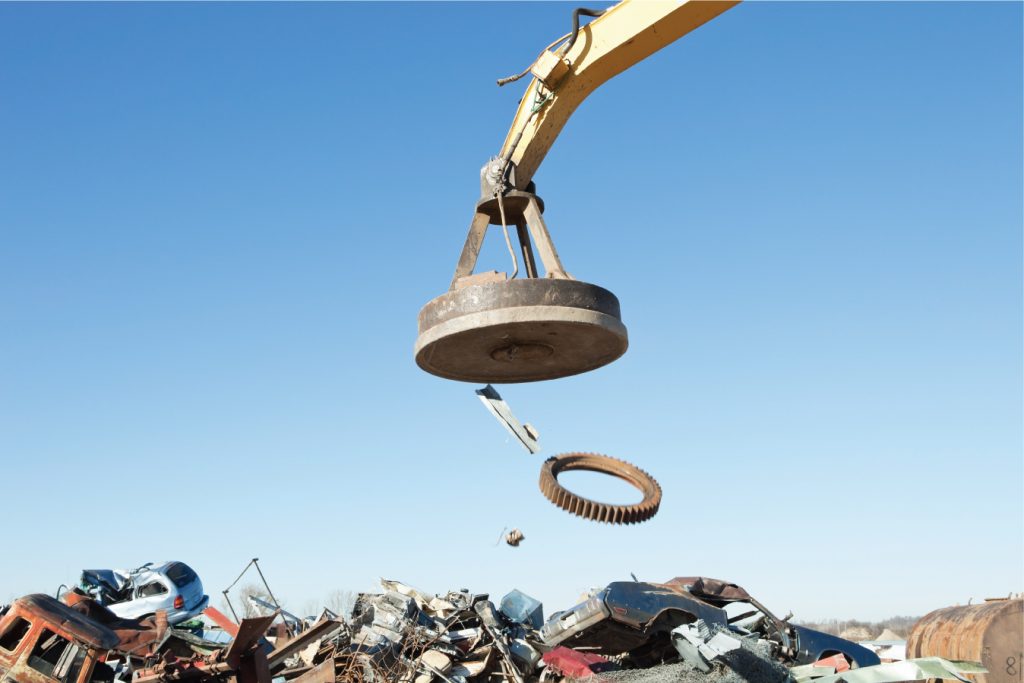An Introduction to Scrap Metal: Part 2 – Types of Scrap Metal and How to Identify Them
In part two of our introduction to scrap metal, we’re taking a look at the types of scrap metal which can be recycled, how they are classified and how you can identify them for yourself before you decide to have your scrap recycled. So let’s get started.

Ferrous and non-ferrous metals
There is one basic distinction to make between different scrap metals: they are either ferrous or non-ferrous. The difference between the two is quite simple:
- Ferrous metals – contain iron and are magnetic. These metals will also contain small amounts of other metals and elements, and will offer little resistance to corrosion.
- Non-ferrous metals – do not contain iron and are not magnetic. These metals offer a much higher resistance to corrosion than ferrous metals.
Examples of ferrous and non-ferrous metals
If you’re unsure as to which group different metals belong to, here’s a quick rundown.
Ferrous metals:
- Steel
- Carbon steel
- Stainless steel
- Iron — cast and wrought
Non-ferrous metals:
- Aluminium and aluminium alloys
- Copper
- Brass
- Bronze
- Lead
- Zinc
- Electrical cable
- Silver, platinum and gold
- Nickel
- Palladium
- Titanium
- Tin
How to identify different metals?
If you simply want to figure out whether a certain metal is ferrous or non-ferrous, then you can just use a magnet and you’ll quickly find your answer. However, if you’re looking for specific types of metal to recycle — perhaps to maximise the value of the materials you’re selling — then you’ll have to look more closely. Here’s how to identify some common ferrous and non-ferrous metals, as well as some of the household items you’ll find these metals in.
- Aluminium – Known for its lightweight nature, aluminium can be identified from its weight and its shiny silvery appearance — and by the fact that it does not sparkle.
- Common places where can aluminium be found – cookware, drink cans, metal fencing, bicycle frames, car bodies, computer components.
- Copper – Copper can be distinguished by its reddish-brown colour. Sometimes confused with brass, you can also identify copper by sound. Do this by striking it with a metal object. Copper typically produces a very muted sound, vastly different to the clearer ring which brass makes.
- Common places where copper can be found – Pipes, electrical wiring, building cladding and roofing materials, PCBs (printed circuit boards), cookware
- Stainless steel – At a glance, stainless steel can be easily confused with aluminium; it has a shiny, silvery appearance and does not sparkle. However, by using a magnet you can see if the item is stainless steel or not — a magnet will not stick to aluminium. Don’t have a magnet handy? You can also tell by the density or weight, as stainless steel is heavier than aluminium.
- Common places where stainless steel can be found – cookware and cutlery, cooking appliances, kitchen sinks, screws, nails, tools.
- Brass – Easily confused with gold and copper, at a glance, brass items have a shinier yellow colour, less dull than copper, and can be distinguished mainly by the noise made when struck; brass will emit a clear ‘ring’.
- Common places where brass can be found – musical instruments, pipe valves, pipe fittings, metal bed frames, mirror frames and light fixtures (brass is commonly used for decorative items because of its gold-like appearance).
- Silver – Silver’s shiny grey appearance should make it easy to identify. Unpolished silver can develop a black tint over time, which will be removed after being polished. As a precious metal, silver is valuable and is often found in premium products.
- Common places where silver can be found – Jewelry, cutlery, silverware, antiques.
If you have scrap metal you’d like to dispose of, the team at Wilton Recycling can take it off your hands. We collect, sort, process and recycle a range of ferrous and non–ferrous metals, offering competitive rates while ensuring a prompt and efficient service every time. To find out more, contact us today.